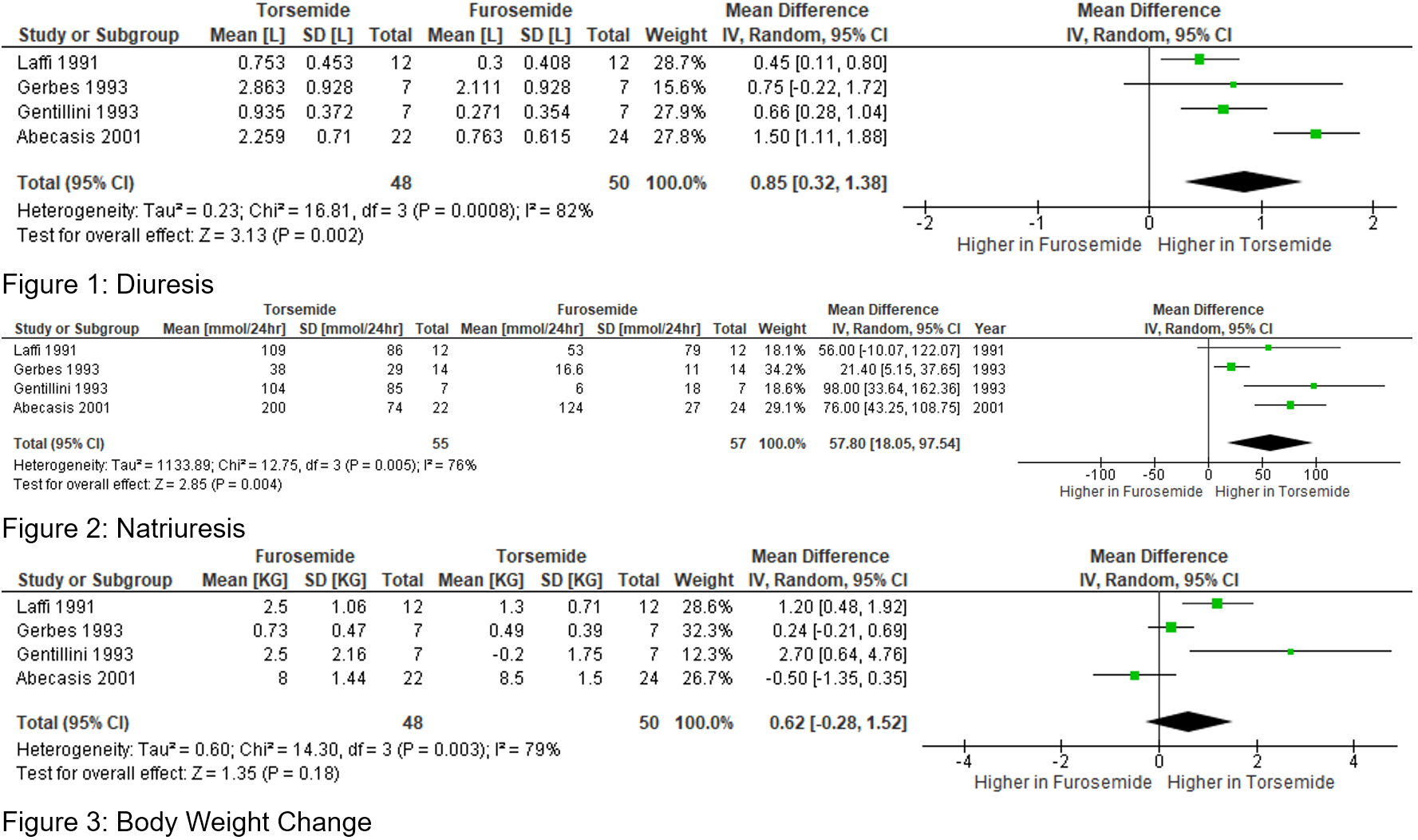Tuesday Poster Session
Category: Liver
P5923 - Comparison of the Efficacy of Torsemide and Furosemide in Managing Ascites Due to Liver Cirrhosis: A Systematic Review and Meta-Analysis
Tuesday, October 28, 2025
10:30 AM - 4:00 PM PDT
Location: Exhibit Hall

Ahmed Shehadah, MD (he/him/his)
United Health Services, Wilson Medical Center
Binghamton, NY
Presenting Author(s)
Ahmed Shehadah, MD1, Ali Jaan, MD2, Alshaima Yousef, MD3, Usama Sakhawat, MD4, Eyad Abdulrazzak, MBBS5, Adam Haq, MBBS, BSc6, Talha A. Sadiq, MBBS, iBSc, ACGI7, Prajjwol D. Bhatta, MD3, Wai Phyo Mon, MRCS7, Ibrar Atiq, MD4, Mahesh Nepal, MD3, Khandokar Talib, MD8, Muhammad Ahmed, MD4, Moheudin Khan, MD4, Hammad Qadri, MD4, James Evans, MLS9, Amanke Oranu, MD1, Toseef Javaid, MD4
1United Health Services, Wilson Medical Center, Binghamton, NY; 2Unity Hospital, Rochester, NY; 3Rochester General Hospital, Rochester, NY; 4United Health Services, Wilson Medical Center, Johnson City, NY; 5Beth Israel Deaconess Medical Center, Harvard Medical School, Needham, MA; 6Leeds Teaching Hospitals NHS Trust, Leeds, England, United Kingdom; 7Basingstoke and North Hampshire Hospital, Basingstoke, England, United Kingdom; 8United Health Services, Johnson City, NY; 9SUNY Upstate Medical University Hospital, Syracuse, NY
Introduction: Ascites management can be challenging, with loop diuretics and aldosterone antagonists forming the mainstay of therapy. While furosemide's efficacy is well-documented, its effectiveness can be limited. Torsemide offers potential advantages, including consistent oral bioavailability, higher potency, absorption unaffected by gut edema, and a longer half-life. Despite its pharmacokinetic advantages, torsemide's clinical superiority remains uncertain. We aim to conduct the first systematic review and meta-analysis to evaluate the comparative effectiveness of torsemide versus furosemide for the management of ascites in patients with liver cirrhosis.
Methods: Multiple databases were searched through November 2024 for studies comparing furosemide and torsemide for ascites secondary to liver cirrhosis. The primary outcomes evaluated were diuresis and natriuresis at 24 hours and the secondary outcome was overall body weight change. Meta-analysis was performed to determine the pooled mean difference to compare outcomes. A random effects model was utilized for the study.
Results: Four randomized controlled trials involving a total of 98 participants, were included in the final analysis. 48 patients were treated with torsemide, while 50 patients were treated with oral furosemide. At the 24-hour mark, diuresis was more pronounced in the torsemide group (TG) compared to the furosemide group (FG), with a mean difference of 0.85 liters (95% CI 0.32-1.38, P=0.002, I2 =82%). Natriuresis at 24 hours was higher in the TG versus the FG, with a mean difference of 57.8 mmol (95% CI 18.05-97.54, P=0.004, I2 =76%). TG experienced a greater weight reduction, with a mean difference of 0.62 kilograms, however, this was not statistically significant but favored torsemide (95% CI - 0.28-1.52, P=0.18, I2 =79%).
Discussion: Our findings suggest that torsemide when compared to furosemide may enhance diuresis, natriuresis, and lead to a greater overall weight reduction in the management of hepatic ascites. Although our analysis is limited to four studies due to the paucity of randomized controlled trials on this topic. The effect beyond 24 hours need to be studied, and the heterogeneity observed in our study may stem from variations in the dosages used across different investigations, potentially limiting generalizability. Torsemide could be a promising alternative to furosemide, however, further research is needed to better elucidate the comparative long term effectiveness and safety profile in this patient population.

Figure: Figures 1(Diuresis), 2(Natriuresis), 3(Body Weight Change): Depicting Tables and Forrest Plots for the Analysis.
Disclosures:
Ahmed Shehadah indicated no relevant financial relationships.
Ali Jaan indicated no relevant financial relationships.
Alshaima Yousef indicated no relevant financial relationships.
Usama Sakhawat indicated no relevant financial relationships.
Eyad Abdulrazzak indicated no relevant financial relationships.
Adam Haq indicated no relevant financial relationships.
Talha Sadiq indicated no relevant financial relationships.
Prajjwol Bhatta indicated no relevant financial relationships.
Wai Phyo Mon indicated no relevant financial relationships.
Ibrar Atiq indicated no relevant financial relationships.
Mahesh Nepal indicated no relevant financial relationships.
Khandokar Talib indicated no relevant financial relationships.
Muhammad Ahmed indicated no relevant financial relationships.
Moheudin Khan indicated no relevant financial relationships.
Hammad Qadri indicated no relevant financial relationships.
James Evans indicated no relevant financial relationships.
Amanke Oranu indicated no relevant financial relationships.
Toseef Javaid indicated no relevant financial relationships.
Ahmed Shehadah, MD1, Ali Jaan, MD2, Alshaima Yousef, MD3, Usama Sakhawat, MD4, Eyad Abdulrazzak, MBBS5, Adam Haq, MBBS, BSc6, Talha A. Sadiq, MBBS, iBSc, ACGI7, Prajjwol D. Bhatta, MD3, Wai Phyo Mon, MRCS7, Ibrar Atiq, MD4, Mahesh Nepal, MD3, Khandokar Talib, MD8, Muhammad Ahmed, MD4, Moheudin Khan, MD4, Hammad Qadri, MD4, James Evans, MLS9, Amanke Oranu, MD1, Toseef Javaid, MD4. P5923 - Comparison of the Efficacy of Torsemide and Furosemide in Managing Ascites Due to Liver Cirrhosis: A Systematic Review and Meta-Analysis, ACG 2025 Annual Scientific Meeting Abstracts. Phoenix, AZ: American College of Gastroenterology.
1United Health Services, Wilson Medical Center, Binghamton, NY; 2Unity Hospital, Rochester, NY; 3Rochester General Hospital, Rochester, NY; 4United Health Services, Wilson Medical Center, Johnson City, NY; 5Beth Israel Deaconess Medical Center, Harvard Medical School, Needham, MA; 6Leeds Teaching Hospitals NHS Trust, Leeds, England, United Kingdom; 7Basingstoke and North Hampshire Hospital, Basingstoke, England, United Kingdom; 8United Health Services, Johnson City, NY; 9SUNY Upstate Medical University Hospital, Syracuse, NY
Introduction: Ascites management can be challenging, with loop diuretics and aldosterone antagonists forming the mainstay of therapy. While furosemide's efficacy is well-documented, its effectiveness can be limited. Torsemide offers potential advantages, including consistent oral bioavailability, higher potency, absorption unaffected by gut edema, and a longer half-life. Despite its pharmacokinetic advantages, torsemide's clinical superiority remains uncertain. We aim to conduct the first systematic review and meta-analysis to evaluate the comparative effectiveness of torsemide versus furosemide for the management of ascites in patients with liver cirrhosis.
Methods: Multiple databases were searched through November 2024 for studies comparing furosemide and torsemide for ascites secondary to liver cirrhosis. The primary outcomes evaluated were diuresis and natriuresis at 24 hours and the secondary outcome was overall body weight change. Meta-analysis was performed to determine the pooled mean difference to compare outcomes. A random effects model was utilized for the study.
Results: Four randomized controlled trials involving a total of 98 participants, were included in the final analysis. 48 patients were treated with torsemide, while 50 patients were treated with oral furosemide. At the 24-hour mark, diuresis was more pronounced in the torsemide group (TG) compared to the furosemide group (FG), with a mean difference of 0.85 liters (95% CI 0.32-1.38, P=0.002, I2 =82%). Natriuresis at 24 hours was higher in the TG versus the FG, with a mean difference of 57.8 mmol (95% CI 18.05-97.54, P=0.004, I2 =76%). TG experienced a greater weight reduction, with a mean difference of 0.62 kilograms, however, this was not statistically significant but favored torsemide (95% CI - 0.28-1.52, P=0.18, I2 =79%).
Discussion: Our findings suggest that torsemide when compared to furosemide may enhance diuresis, natriuresis, and lead to a greater overall weight reduction in the management of hepatic ascites. Although our analysis is limited to four studies due to the paucity of randomized controlled trials on this topic. The effect beyond 24 hours need to be studied, and the heterogeneity observed in our study may stem from variations in the dosages used across different investigations, potentially limiting generalizability. Torsemide could be a promising alternative to furosemide, however, further research is needed to better elucidate the comparative long term effectiveness and safety profile in this patient population.

Figure: Figures 1(Diuresis), 2(Natriuresis), 3(Body Weight Change): Depicting Tables and Forrest Plots for the Analysis.
Disclosures:
Ahmed Shehadah indicated no relevant financial relationships.
Ali Jaan indicated no relevant financial relationships.
Alshaima Yousef indicated no relevant financial relationships.
Usama Sakhawat indicated no relevant financial relationships.
Eyad Abdulrazzak indicated no relevant financial relationships.
Adam Haq indicated no relevant financial relationships.
Talha Sadiq indicated no relevant financial relationships.
Prajjwol Bhatta indicated no relevant financial relationships.
Wai Phyo Mon indicated no relevant financial relationships.
Ibrar Atiq indicated no relevant financial relationships.
Mahesh Nepal indicated no relevant financial relationships.
Khandokar Talib indicated no relevant financial relationships.
Muhammad Ahmed indicated no relevant financial relationships.
Moheudin Khan indicated no relevant financial relationships.
Hammad Qadri indicated no relevant financial relationships.
James Evans indicated no relevant financial relationships.
Amanke Oranu indicated no relevant financial relationships.
Toseef Javaid indicated no relevant financial relationships.
Ahmed Shehadah, MD1, Ali Jaan, MD2, Alshaima Yousef, MD3, Usama Sakhawat, MD4, Eyad Abdulrazzak, MBBS5, Adam Haq, MBBS, BSc6, Talha A. Sadiq, MBBS, iBSc, ACGI7, Prajjwol D. Bhatta, MD3, Wai Phyo Mon, MRCS7, Ibrar Atiq, MD4, Mahesh Nepal, MD3, Khandokar Talib, MD8, Muhammad Ahmed, MD4, Moheudin Khan, MD4, Hammad Qadri, MD4, James Evans, MLS9, Amanke Oranu, MD1, Toseef Javaid, MD4. P5923 - Comparison of the Efficacy of Torsemide and Furosemide in Managing Ascites Due to Liver Cirrhosis: A Systematic Review and Meta-Analysis, ACG 2025 Annual Scientific Meeting Abstracts. Phoenix, AZ: American College of Gastroenterology.
